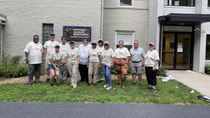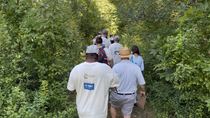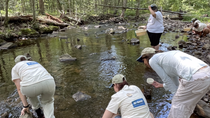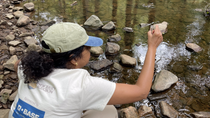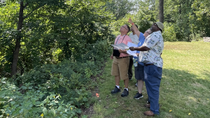Our Stories
New Jersey educators uncover the power of chemistry in natural ecosystems
Twelve educators from middle schools, high schools and universities across the state of New Jersey, came together at the Scherman Hoffman Wildlife Sanctuary for a hands-on learning experience focused on environmental education.
Supported by BASF, the New Jersey Audubon conducted a three-day workshop between August 12-14, 2024, with educators from different disciplines, including mathematics, science and physical education from middle schools, high schools and universities to deep-dive into New Jersey’s complex ecosystems through hands-on experiments and live discussions.
Among the topics addressed throughout those three days were environmental issues impacting local ecosystems, the delicate balance of the different chemical processes in the environment and how easily phenomena like climate change can disrupt it.
This workshop included observation as well as experiments, in which teachers had to grab their testing kits, analyze water chemistry and collect data. They also were taught about the importance of macroinvertebrates – a tiny but essential group of organisms – in measuring the quality and health of rivers and streams.
The staff are masters of content. The activities were meaningful and accessible to anyone, and the space was welcoming and inspiring. It allowed us to connect and build deeper understanding and meaningful action plans to implement climate change education in our classroom.
Spreading the message
The teachings provided in this three-day workshop not only bring light to local ecosystems and how the smallest changes can have rippling effects but also equip educators with powerful strategies to take back to their classrooms, become environmental stewards, and engage young minds in the importance of our surroundings.
They learned all about the importance of creating shade barriers to protect ecosystems, reducing vehicle use to improve air quality, planting native species to help essential pollinators like insects and birds, growing trees to capture carbon emissions and designing rain gardens to reduce flooding and filter runoff soil and water.
While I have always been aware of my role/ responsibility in my ecosystem, I was moved by the commitment of this program to generate hope and direct actions towards its preservation, and I hope to bring these values to my classroom.
With a renewed sense of purpose, these educators hold the keys to inspiring the next generation of scientists, innovators, and thought leaders on the power of chemistry to solve present and future challenges and bring about positive change in their communities.
Published on October 4, 2024 by Mariana Licio.
For media inquiries or to repurpose the article, please contact Lisa Brown.
